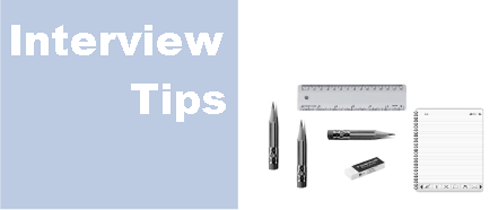
Interviews are an important part of employee assessment. Interview performance can play a make or break role in the process of hiring someone. What is not known is that interviewing skills can be learnt and improved. Therefore preparing for interviews is key to success in getting a job.
The following information is provided to help you be as successful as possible in your job interviews. Please refer to the section on ‘job interviews--do’s and don’ts on behavioural etiquettes and physical appearance.
Learn to make statements about yourself in these key areas:
Knowledge and Training
Example: B.S. degree in.......3.3 major GPA; projects completed
Experience
Examples: class projects; senior projects; volunteer work; employment
Present project or work titles and some specifics about the project
Skills and roles
Examples: organisational; communication; leadership; computer; laboratory; mechanical; Present specific skill names such as x computer language and job titles such as School Open HOuse Committee Chair etc.
Interests
Examples: professional and personal; clubs, volunteer work, athletics, music
Present specifics e.g. Sing in Cal Poly Choir; Ran L.A. Marathon; Active in IEEE
Goals
Short and Long term
Examples: to join a certain co-op; to enter a project in competition; to participate in XX program; to become a certain kind of engineer
Practise with friends or colleagues
The best way to prepare for an interview is to practise with friends, relatives, or a Career Counselor. Using this checklist to prepare yourself prior to any interview situation will help you stay calm and focused during the session. Name 2 to 3 skills, abilities, or exemplars for each question.
Know the employer and the position
Prepare questions to ask
An interview is a two way process; you are interviewing the employer while you are being interviewed. Spend some time thinking about what further information you need about the employer and the position. Good questions are ones that have been formulated through your own insight. Be sure, however, that your questions are not answered somewhere in the company literature or the job description.
You can interject your questions at any appropriate time during the interview.
The interviewer may signal that the interview is ending by asking whether you have any additional questions. If you do not have any concluding questions you may take this opportunity to summarise your valued to the employer and repeat your sincere interest in the position based on the additional information you gained during the interview. Before you leave the interview be sure to find out the next stop in the interview process. If the interviewer has not told you, it is appropriate to ask "When may I expect to hear from you?"
Books
Suggested further reading: Career Planning Guide: books on interview preparation and interviewing in the Career and Internship Office
About Yourself
Current Affairs
Situational Questions
IQ Questions
Sample questions for the interviewer
Links
Common interview questions
Do’s
Presentation
Exchange
Content
Don’ts
Different companies and work requirements will determine how an interview is evaluated. Below is an example of a rating scheme which is used in CAIO’s mock interviews. It will give you a general picture of what interviewers are paying attention to in interviews.
Rating Key
First Impression/Grooming/Manners
Content of Job Interview
Closing the Interview
It appears to be a trend that many big companies are using behavioural interviewing techniques on top of or in place of traditional ones. This is because behavioural interviews can better predict future on-the-job behaviour compared to traditional interviewing techniques.
While it may be possible for interviewees to figure out what an interviewer wants to hear if the interviewee is informed or intelligent enough as the interviewer may never know if the interviewee would really react in a given situation on the job, behavioral-based interviewing is more difficult to fein.
In a behavioural interview, it's much more difficult to give responses that are untrue to your character. When you start to tell a behavioural story, the behavioural interviewer typically will pick it apart to try to get at the specific behaviour(s). The interviewer will probe further for more depth or detail such as "What were you thinking at that point?" or "Tell me more about your meeting with that person," or "Lead me through your decision process." If you've told a story that's anything but totally honest, your response will not hold up through the barrage of probing questions.
Employers use the behavioural interview technique to evaluate a candidate's experiences and behaviours so they can determine the applicant's potential for success. The interviewer identifies job-related experiences, behaviours, knowledge, skills and abilities that the company has decided are desirable in a particular position.
Learn more about behavioral interviews
Links
Behavior interviews